- Size
- Smallest
- Small
- Small to Medium
- Medium
- Large
- Giant
- Characteristics
- Smartest
- Hypoallergenic
- Fluffy
- Best Guard
- Best Family
- Best for Kids
- Low Shedding
- Healthiest
- Police Dogs
- Most Calm
- Quietest
- Color
- White
- Black
- Grey
- Brown
- Blue
- Red
- Coat
- Hairless
- Short
- Long
- Origin
- Japan
- China
- Australia
- Germany
- Italy
- United States
- France
- Group
- Hound
- Terrier
- Herding
- Toy
- Working
- Sporting
8 Easy-to-Care-for Pet Bird Species for Beginners
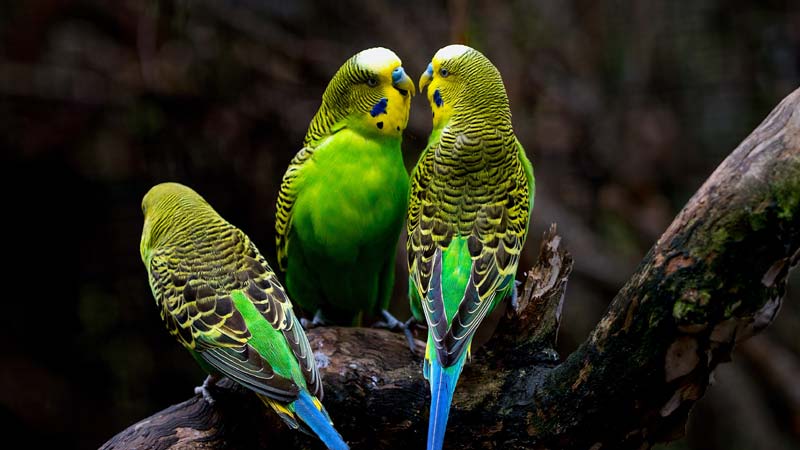
Photo by David Clode on Unsplash
Owning a pet bird can be a delightful experience, but it also comes with responsibilities and time commitments. If you're looking for a bird species that requires minimal effort to care for, we've got you covered. In this article, we will introduce you to eight low-maintenance pet bird species that are known for being on the smaller side, resulting in less mess and easier cleaning.
These birds may not require constant handling or out-of-cage playtime, making them suitable for individuals who have limited time but still want the joy of having a feathered friend. While they do appreciate the interaction, some of these birds are perfectly content entertaining themselves with toys or the company of other birds.
Here are eight bird species that offer companionship and ease of care:
- 1. Canary
- 2. Budgerigar (Budgie)
- 3. Cockatiel
- 4. Lovebird
- 5. Finch
- 6. Dove
- 7. Pionus Parrot
- 8. Lineolated Parakeet
1Canary
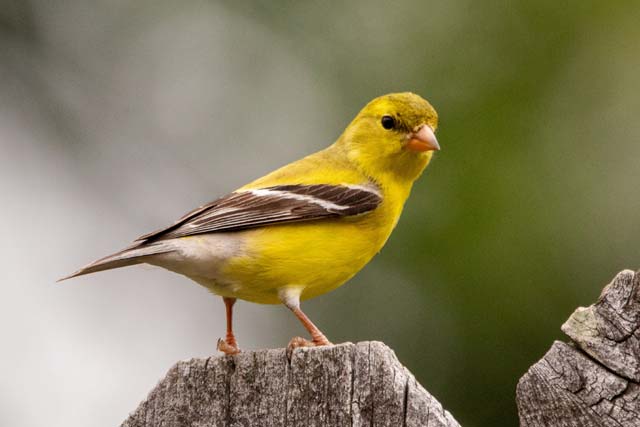
Photo by Joshua J. Cotten on Unsplash
Lifespan: 7-10 years
Canaries are small, low-maintenance birds that are known for their beautiful songs. They require a healthy diet, a spacious cage for flying, and some toys for mental stimulation.
Housing and Environment:
Cage: Provide a spacious cage that allows for flying and movement. A length of at least 20 inches is recommended to ensure ample space.
Location: Place the cage away from drafts and direct sunlight. Canaries enjoy a well-lit environment but should be protected from extreme temperatures.
Perches and Toys: Offer different perches of varying diameters to encourage foot exercise. Toys like swings and mirrors provide mental stimulation.
Care Tips:
Seeds and Pellets: A high-quality seed mix or pellet formulated for canaries is essential. Supplement this with fresh vegetables like spinach, broccoli, and carrots.
Fresh Water: Ensure a clean water supply daily. Canaries drink frequently, especially if they're fed dry seeds.
2Budgerigar (Budgie)
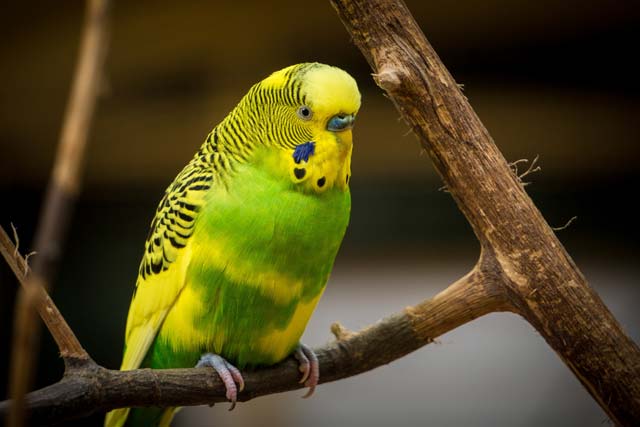
Photo by Dalton Touchberry on Unsplash
Lifespan: 5-10 years
Budgies are small parrots that are intelligent, social, and relatively easy to care for. They require a roomy cage with plenty of toys and a few hours of daily interaction and playtime with their owners.
Housing and Environment:
Cage: Provide a spacious cage with horizontal space for flying. A minimum size of 18x18x18 inches is recommended.
Location: Place the cage away from drafts and direct sunlight. Budgies enjoy natural light but should have a shaded area in the cage.
Perches and Toys: Offer natural wood perches of varying diameters. Toys like bells, swings, and puzzles keep them mentally engaged.
Care Tips:
Seed Mix and Pellets: A high-quality seed mix or pellets specifically designed for budgies should be the primary diet.
Fresh Greens: Offer fresh vegetables like kale, spinach, and carrots, and occasional fruit like apple or berries for added nutrients.
Water: Provide fresh, clean water daily in a secure water dispenser.
3Cockatiel
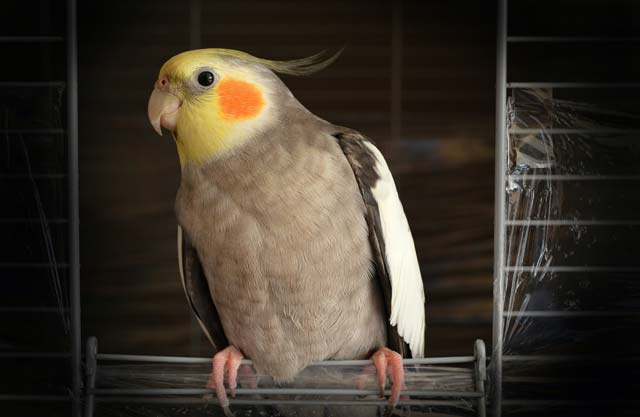
Photo by Sultan on Unsplash
Lifespan: 15-20 years
Cockatiels are another popular choice for pet bird enthusiasts. They are known for their friendly and social nature, and they can be easily trained to whistle tunes and perform tricks. They require a spacious cage with toys and a few hours of out-of-cage playtime each day.
Housing and Environment:
Cage: Provide a spacious cage with horizontal space for flying and stretching wings. A cage size of at least 18x18x24 inches is recommended.
Location: Place the cage away from drafts and direct sunlight. Cockatiels enjoy natural light but should have a shaded area in the cage.
Perches and Toys: Offer natural wood perches of varying diameters. Toys like bells, swings, and puzzles keep them mentally stimulated.
Care Tips:
Pellets and Seeds: A balanced diet with pellets specifically formulated for cockatiels and a small amount of high-quality seed mix should be their primary diet.
Fresh Greens and Fruits: Offer fresh vegetables like broccoli, spinach, and occasional fruits like apple or melon for added nutrition.
Water: Provide fresh, clean water daily in a secure water dispenser.
4Lovebird
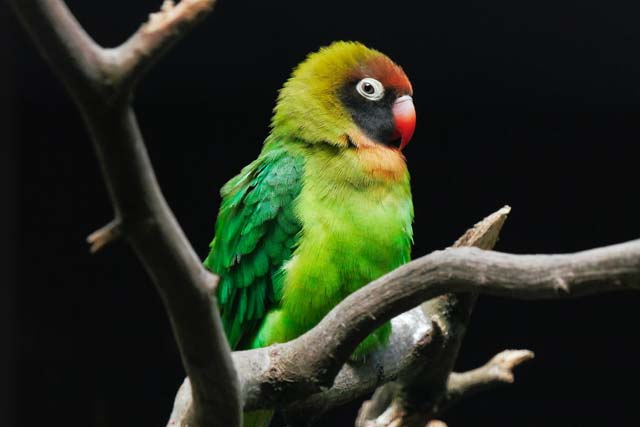
Photo by Steve Payne on Unsplash
Lifespan: 10-15 years
Lovebirds are small parrots that are highly social and enjoy interacting with their owners. While they can be kept in pairs, single lovebirds can thrive with a few hours of daily interaction with their owners. A roomy cage with plenty of toys is ideal for their enrichment.
Housing and Environment:
Cage: Provide a spacious cage with enough room for flying and playing. A minimum cage size of 24x24x24 inches is recommended.
Location: Place the cage away from drafts and direct sunlight. Lovebirds enjoy natural light but should have a shaded area in the cage.
Perches and Toys: Offer natural wood perches of varying diameters. Toys like bells, swings, and puzzles keep them mentally stimulated.
Care Tips:
Pellets and Seeds: Offer a high-quality pellet-based diet specifically formulated for lovebirds along with a small amount of seed mix.
Fresh Greens and Fruits: Provide fresh vegetables like carrots, leafy greens, and fruits like apple or berries for added nutrients.
Water: Ensure fresh, clean water is available daily in a secure water dispenser.
5Finch
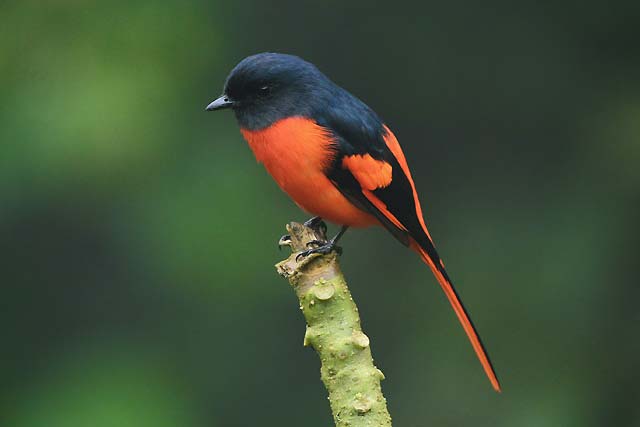
Photo by Azhar Suratman on Unsplash
Lifespan: 5-10 years
Finches are small birds that thrive in a flock environment. They enjoy the company of their own kind and do not require handling or out-of-cage playtime. They mainly need a roomy flight cage, a healthy diet, and a few friendly flock-mates.
Housing and Environment:
Cage: Provide a spacious flight cage rather than tall ones, as finches prefer horizontal flight. A minimum cage size of 24x24x24 inches for a pair is recommended.
Location: Place the cage away from drafts and direct sunlight. Finches enjoy natural light but should have a shaded area in the cage.
Perches and Toys: Offer natural wood perches of varying diameters. Toys like swings and mirrors provide mental stimulation.
Care Tips:
Seeds and Pellets: A high-quality finch seed mix or pellets specifically formulated for finches should be their primary diet.
Fresh Greens: Offer fresh vegetables like lettuce, spinach, and occasional herbs for added nutrients.
Water: Ensure fresh, clean water is available daily in a secure water dispenser.
6Dove
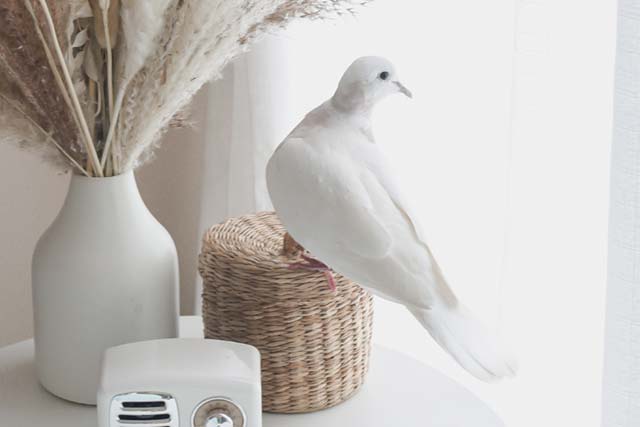
Photo by Paige Cody on Unsplash
Lifespan: 10-15 years
Doves are gentle birds that enjoy interacting with their owners but are also content entertaining themselves. They require a healthy diet, a few hours of out-of-cage exercise, and access to UV light for their well-being.
Housing and Environment:
Cage: Provide a spacious cage, considering they are larger than finches or canaries. A cage size of 24x24x24 inches or larger is recommended.
Location: Place the cage away from drafts and direct sunlight. Doves enjoy natural light but should have a shaded area in the cage.
Perches and Toys: Offer natural wood perches of varying diameters. Simple toys like swings or soft, chewable items are suitable.
Care Tips:
Seeds and Pellets: A quality dove seed mix or pellets specifically formulated for doves should be their primary diet.
Fresh Greens: Offer fresh vegetables like leafy greens, peas, and occasional fruits like berries for added nutrients.
Water: Ensure fresh, clean water is available daily in a secure water dispenser.
7Pionus Parrot
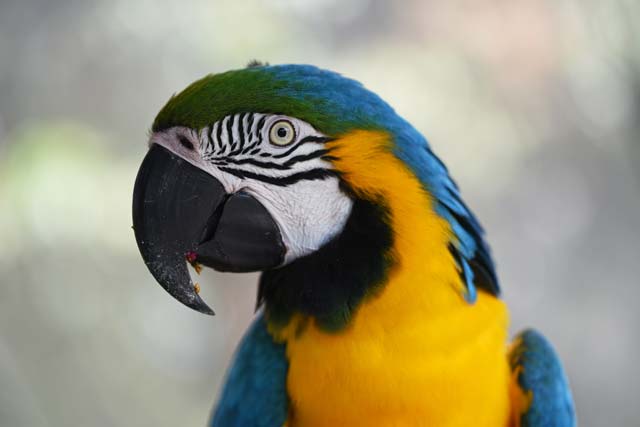
Photo by David Clode on Unsplash
Lifespan: 25-40 years
Pionus Parrots are known for their devotion to their caretakers while still maintaining independence. They love playing with their owners and with toys, and they can handle being alone for several hours. Providing them with a spacious cage and daily exercise is essential.
Housing and Environment:
Cage: Provide a spacious cage to accommodate their size and allow for movement. A cage size of 24x24x36 inches or larger is recommended.
Location: Place the cage in a quiet area away from drafts and direct sunlight. Pionus Parrots enjoy natural light but should have a shaded area in the cage.
Perches and Toys: Offer sturdy perches of varying sizes and textures. Provide toys such as puzzles, chewable items, and ropes for mental stimulation.
Care Tips:
Pellets and Seeds: A high-quality pellet-based diet specifically formulated for medium-sized parrots is ideal. Supplement this with a small amount of seed mix.
Fresh Greens and Fruits: Offer a variety of fresh vegetables like carrots, broccoli, and occasional fruits like berries or apple for added nutrition.
Water: Ensure fresh, clean water is available daily in a secure water dispenser.
8Lineolated Parakeet
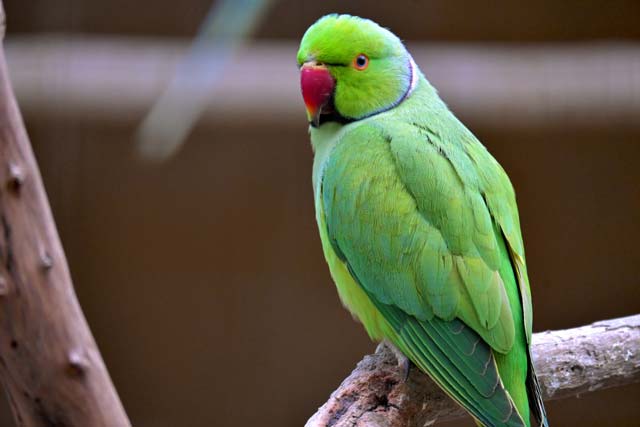
Photo by Jayanth Muppaneni on Unsplash
Lifespan: 15-20 years
Lineolated parakeets are calm and social birds that require several hours of daily interaction with their owners. They are small in size and do not take up much space, making them suitable for those with limited room.
Housing and Environment:
Cage: Provide a spacious cage with horizontal space for flying. A cage size of 24x24x24 inches or larger is recommended.
Location: Place the cage away from drafts and direct sunlight. Lineolated Parakeets enjoy natural light but should have a shaded area in the cage.
Perches and Toys: Offer natural wood perches of varying diameters. Toys like swings, ladders, and chewable items provide mental stimulation.
Care Tips:
Pellets and Seeds: A high-quality pellet-based diet specifically formulated for small parakeets is ideal. Supplement this with a small amount of seed mix.
Fresh Greens and Fruits: Offer fresh vegetables like leafy greens, broccoli, and occasional fruits like apple or berries for added nutrients.
Water: Ensure fresh, clean water is available daily in a secure water dispenser.
The Bottom Line
While these bird species offer relative ease in maintenance, potential bird owners should note that they live for a decade or longer, emphasizing the significant commitment involved despite their low-maintenance nature.
Careful consideration of a bird's needs, including diet, cage requirements, mental stimulation, and social interaction, remains paramount. Consulting avian experts or veterinarians for specific care advice based on the chosen species can ensure a happy and healthy life for your avian companion.
You May Also Like
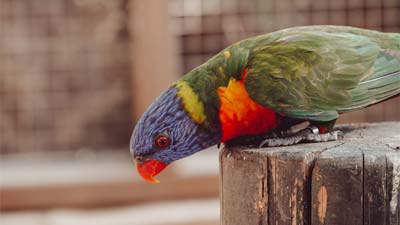 Other Pets, Pet BirdsThe Lineolated Parakeet: A New Owner's Guide (What To Know)
Other Pets, Pet BirdsThe Lineolated Parakeet: A New Owner's Guide (What To Know)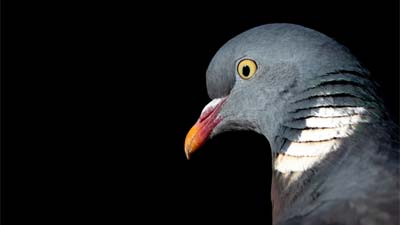 Other Pets, Pet BirdsThe Dove: A New Owner's Guide (What To Know)
Other Pets, Pet BirdsThe Dove: A New Owner's Guide (What To Know)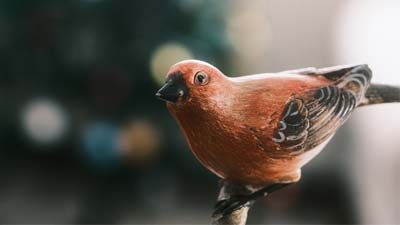 Other Pets, Pet BirdsThe Finch: A New Owner's Guide (What To Know)
Other Pets, Pet BirdsThe Finch: A New Owner's Guide (What To Know)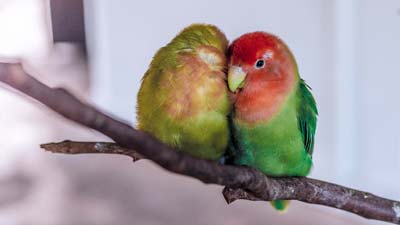 Other Pets, Pet BirdsThe Lovebird: A New Owner's Guide (What To Know)
Other Pets, Pet BirdsThe Lovebird: A New Owner's Guide (What To Know)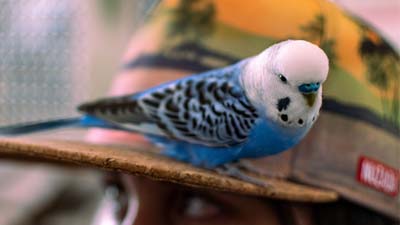 Other Pets, Pet BirdsThe Budgerigar: A New Owner's Guide (What To Know)
Other Pets, Pet BirdsThe Budgerigar: A New Owner's Guide (What To Know)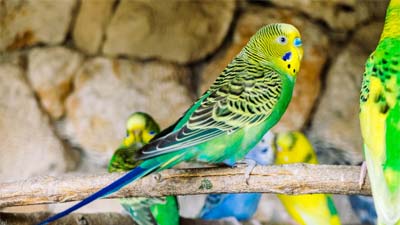 Other Pets, Pet BirdsThe Canary: A New Owner's Guide (What To Know)
Other Pets, Pet BirdsThe Canary: A New Owner's Guide (What To Know)